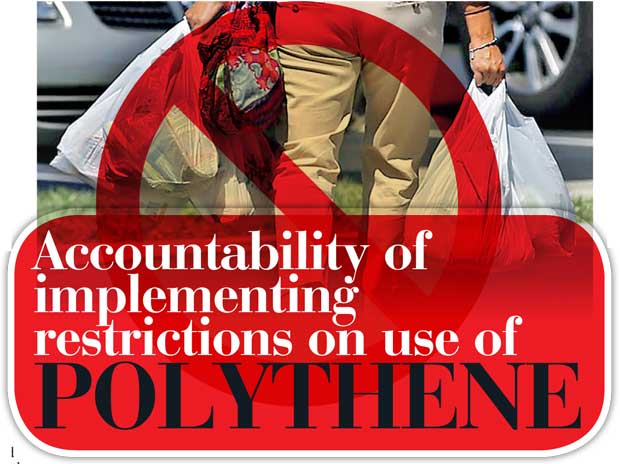Reply To:
Name - Reply Comment
Last Updated : 2024-04-24 11:56:00

The baseless, opposing attitude to any decision taken in favour of national interests has become a common feature among the people of Sri Lanka. This negative attitude to any proposal put forward for the sake of proper evaluation of contents therein has caused irreparable loss to the country.
The usual uproar seems to be spiraling against the restrictions recently imposed on the use of polythene products such as lunch sheets, bags popularly known as ‘silisili’ bags and other polythene based products. There are two different views of opinion in this regard. While there are usual roaring by those who don’t want to bother to understand the real situation. Here are also trends of favourable response from those who view the problem analytically  and understand long-term gains of the remedial measures taken by the authorities to ease the gravity of looming disaster linked with the intense use of polythene products.
and understand long-term gains of the remedial measures taken by the authorities to ease the gravity of looming disaster linked with the intense use of polythene products.
The need for restrictions on extensive use of polythene and polythene products and haphazard disposal manners of these items was first stressed about a decade ago in 2007 when the usage of polythene began to pose a great threat to the human life, animal world and the environment.
At the time, a total ban was not imposed but the thickness of the extensively-used lunch sheets was prescribed to be of 20 micro metre considering possibility of re-using the polythene sheets after properly cleaning them and for the convenience of separating the disposed polythene sheets from the rest of the garbage.
The thick polythene then existed in use posed difficulties to sort them out from other decaying waste and these thick sheets also reacted as resistant to the decaying process of other materials disposed. However, although polythene sheets of prescribed gauge were introduced to the market, the failure to follow sorting procedures stipulated with new measures rendered it unsuccessful. And subsequently, these garbage mixed with degradable polythene piled up and formed huge mountains that collapsed and killed hundreds of people.
The recent outbreak of Dengue that claimed a large number of lives and sudden surge of floods in Colombo and its suburbs are other examples of menace of garbage accumulation beyond controllable level.
Efforts taken to encourage polythene of lower gauge also serves as a measure of economy as large some of money spent for the import of raw materials to produce polythene sheets.
Another favourable result gained in implementing the restrictions introduced in 2007 is the initiative to minimise the issuing of polythene bags to customers by the islandwide supermarket network.
Despite the regularisation of polythene use, supermarkets are still major centres responsible for adding more degradable polythene to the environment. However, the managements of supermarkets have now taken apt steps to discourage their customers on the use of polythene bags.
The strength and rights enjoyed by consumers in foreign countries have made them capable of forming consumer societies to halt any harmful item entering the markets. The inability of local customers to see the right and power they enjoy has left them to be constant prey to the world of trade. This has resulted in flooding our markets with substandard goods.
Attractively prepared advertisements being displayed or glamorous packing and wrappers to lure young women to beautifying products are good examples that reflect consumer ignorance to the tactics of producers and traders. The instances of substandard beautifying items with intoxicant substance entering the local market are quite possible in the absence of proper regulatory measures to ban these items.
"The inability of local customers to see the right and power they enjoy has left them to be constant prey to the world of trade. This has resulted in flooding our markets with substandard goods"
There are also instances of consumers being victims of market forces due to the lack of knowledge of their rights and power which allow businessmen to exploit consumers by abusing their own rights and powers. Seeking a court relief by consumers on the ban imposed in 2007 on polythene use is another example of abusing their own rights by others.
Their own ignorance and reluctance to accept the favourable solutions introduced to hazardous situations faced by them have led them to experience more devastating conditions like the Meethotamulla catastrophe. After all these destruction, we are again focusing to overcome the problems generated with the use of polythene after a decade. However, baseless but organised and politician-supported protests against the attempts to minimise the use of polythene may come up as usual. Meanwhile, some may call for the impracticable total ban of polythene, plastics and allied products, to dilute the significance of the true efforts to minimise the use of polythene and plastic to a possible extent.
To achieve the expected targets with the restriction on the use of polythene and plastics, the following factors must be subjected to a thorough analysis:
- A careful evaluation of the comparatively high advantages of convenience and facilities gained with the coming of polythene and other non-degradable material came into use against the losses so far suffered in using these materials. And the introduction of a proper procedure for the use of less harmful polythene considering their applicability in the modern world.
The extent of consumers’ and producers’ compatibility to the new procedures introduced with a legal effect and responsibility of the relevant authorities to prepare a suitable background to ensure the proper enforcement of stipulated procedures. And to encourage the people to sustain the compliance to new procedures. However, under the prevailing conditions, many deficiencies are visible in this respect.
It is of foremost necessity to introduce the best alternatives (materials) in place of the banned materials, mainly for the convenience of consumers. Nevertheless, it should be mentioned that there is no scientific mechanism to test the environmental friendliness of alternatives without depending on producer assurance of the quality of their alternative products.
There is adequate potentiality within the country to establish laboratories, conduct tests and to do research with a minimum effort, but due to the absence of a proper streamlining of procedures, these resources remain scattered and idle.
It is also important to focus on the possibility of new alternatives (bags) made using other highly non-degradable material that have not been included in the related act. This situation has opened new avenues for researchers of the allied field in universities and other scientists to refute challenges from some organised groups about the contribution and effectiveness of experts’ services for the benefit of the country.

Add comment
Comments will be edited (grammar, spelling and slang) and authorized at the discretion of Daily Mirror online. The website also has the right not to publish selected comments.
Reply To:
Name - Reply Comment
US authorities are currently reviewing the manifest of every cargo aboard MV
On March 26, a couple arriving from Thailand was arrested with 88 live animal
According to villagers from Naula-Moragolla out of 105 families 80 can afford
Is the situation in Sri Lanka so grim that locals harbour hope that they coul